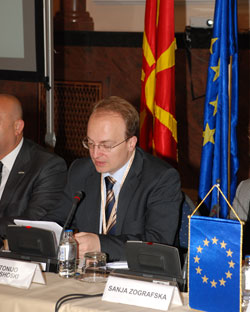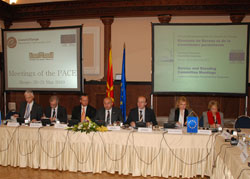Friday, 21 May 2010
ADDRESS BY H.E. Antonio Milososki MINISTER OF FOREIGN AFFAIRS at the Session of the PACE Standing Committee
 Distinguished President Mevlut Cavusoglu,
Distinguished President Mevlut Cavusoglu,
Esteemed Parliamentarians,
Members of the Secretariat,
Ladies and Gentlemen,
It is my great honour to welcome you in Skopje and to address this distinguished forum in my capacity as the Chairman of the Committee of Ministers of the Council of Europe. Chairing the oldest political organization in Europe presents a great challenge for me personally and for my country. There are many underlying reasons for these challenges, yet I will not dwell upon some of the obvious and at the same time unique ones. Instead I would concentrate on matters of interest for the Organisation.
As Chairmanships with the decision-making body of the Council of Europe come in a timespan of about 23 to 24 years, they present an exceptional opportunity for foreign policy promotion. During the six-month chairmanship our visibility at the international scene will be heightened, which brings numerous benefits and places us in a position, which we will be experiencing for the first time. That is an additional impetus to act responsibly and with great care when chairing the Committee of Ministers.
Our country stands ready to manage the steering of the Committee of Ministers by keeping in mind the interests of all the Member States, as well as the interests of the Organization as a whole. We have also taken into consideration issues that are of importance for our Region, being thus focused on the shared commitment to bringing the Region closer to fully-fledged EU-integration, which cannot be achieved without an effective and sustainable implementation of the Council of Europe’s standards and principles. Our determination to further promote good neighbourliness and to contribute to the European development of our Region is stronger than ever.
We are fully cognizant of the fact that the Chairmanship could open new political horizons for us and could reaffirm the active role we intend to play in the following 6 months. I hope this experience will help us better comprehend the political realities, while forging close ties with new friends.
As Isaac Newton once said “If I have seen further it is by standing on the shoulders of giants” then the Council of Europe is certainly the giant that has made Europe democratic and united around common values.
Esteemed Members of Parliaments,
Ladies and Gentlemen,
The priorities of the Macedonian Chairmanship have been chosen relying on our national perspectives, but at the same time having in mind the wider interest of the Region and of the Organisation as a whole. Consistency between Chairmanships of the Committee of Ministers is an important issue. Therefore our priorities will ensure logical continuity of the activities of the Committee and will focus on: the reform of the European Court of Human Rights, ensuring the continued effectiveness of the European Convention on Human Rights, strengthening the principle of subsidiarity by substantively integrating the Convention in the national legal systems in order to secure its direct application, in pursuance with the Interlaken process commitments; implementing gender equality standards and mechanisms with an emphasis on gender budgeting; fighting corruption; ensuring social cohesion; strengthening intercultural and inter-religious dialogue; integration of national minorities, including Roma and improving youth participation in the democratic and political processes of the South East European. All of these different issues are grouped around three main thematic priorities, which help us spread the political messages of the Macedonian Chairmanship. As you already know, these thematic areas are: 1) Strengthening human rights protection; 2) Fostering integration while respecting diversity and 3) Promoting youth participation.
The need to cooperate closer and to have more cohesive approach regarding human rights protection is connected to the Interlaken reform process, but also to the reform process of our Organization initiated by Secretary General Jagland. We have to safeguard the most valuable institution of our human rights system and to improve its functioning in parallel with measures undertaken in the legislations and judicial practices of the Member States and by the Court itself. The decisions taken at the 120th session of Committee of Ministers reaffirmed our determination to work intensively on the implementation of the documents adopted at the Interlaken Conference.
Our contribution towards this process will be the organization of a Conference by the Macedonian Ministry of Justice in November 2010 on the relevant topic of “Strengthening subsidiarity: integrating the Court’s case-law in the national law and practice”. The aim of this Conference will be to adopt conclusions that will be transmitted as concrete messages to the Conference of Ministers of Justice of the Council of Europe Member-States, to be held in Istanbul on 24-26 November, 2010 during the Turkish Chairmanship.
The political realities on our Continent are constantly changing and a Europe of tomorrow may not resemble the Europe of today. We have to follow closely this dynamic process and be prepared for the new challenges that our societies will face in future. We have to adopt better integrative policies and unite all the diversities that exist in our countries. I see Europe of tomorrow as more united in its diversities, be they of linguistic, ethnic or religious nature.
One of the aims of the Council of Europe, which derives from the commitment made at the Warsaw Summit, is to achieve more inclusive Europe, which cannot be imagined without the integration of national minorities in European societies. The integration of minorities means creating more inclusive and cohesive societies where individuals and groups have the opportunity of equally participating in their communities. The Macedonian Ministry of Foreign Affairs will organize a Conference on the theme “Strengthening the cohesion of European societies: effective participation of persons belonging to national minorities in decision-making process”, as an issue importance for achieving de facto integration.
 The Standing Committee will consider the report on the “Gender budgeting as a tool for safeguarding women’s health. In this context, let me point out that during our Chairmanship we will organize a Seminar on the issue of gender budgeting. Member States of the Council of Europe agree that gender equality can be implemented in practice, if policies are gender sensitive and supported by adequate budgets which, in their process of elaboration are based on gender analysis and integrate a gender perspective. Successful achievement of gender equality is linked to the necessary implementation of both gender equality policies and a gender mainstreaming strategy, including gender budgeting. Being among the first countries in the Region to include a gender analysis as a central, transversal element in policies and programmes in the Departments of Social Welfare, Labour and Finance has motivated us to place a special focus on this particular issue of importance to the Committee of Ministers, but of the Parliamentary Assembly, as well.
The Standing Committee will consider the report on the “Gender budgeting as a tool for safeguarding women’s health. In this context, let me point out that during our Chairmanship we will organize a Seminar on the issue of gender budgeting. Member States of the Council of Europe agree that gender equality can be implemented in practice, if policies are gender sensitive and supported by adequate budgets which, in their process of elaboration are based on gender analysis and integrate a gender perspective. Successful achievement of gender equality is linked to the necessary implementation of both gender equality policies and a gender mainstreaming strategy, including gender budgeting. Being among the first countries in the Region to include a gender analysis as a central, transversal element in policies and programmes in the Departments of Social Welfare, Labour and Finance has motivated us to place a special focus on this particular issue of importance to the Committee of Ministers, but of the Parliamentary Assembly, as well.
One of the Macedonian Chairmanship priorities promotes youth participation in the Region of South East Europe and this could be considered as one of the Council of Europe’s contribution marking 2010 as the “International Year of Youth”, as proclaimed by the UN. The Republic of Macedonia intends to launch a process which is aimed at providing an organized setting for exchange of views among young people, which could help further foster their participation in political processes and in democratic reforms in their respective countries.
Proactive inclusion of the youth in the creation of the future of the South East European Region, founded on European values and standards of the Council of Europe in the area of human rights protection, rule of law and democracy will enable prompter overcoming of problems from the distant and contemporary history of this Region. The energy and enthusiasm that young people bring in the cooperation with the authorities regarding issues of their interest and of broader social importance represent a valuable investment in designing policies that would be a reflection of real situations which include the views of young people and policies that can provide adequate solutions to their concerns.
The Macedonian Chairmanship will also be especially focused on strengthening the cooperation with other international organizations, especially with the EU, OSCE, and the UN. In the past years, the Council of Europe has made progress in strengthening the relations with other European institutions and international organisations, starting with the European Union, the OSCE and the United Nations. With the entry into force of the Lisbon Treaty and the Charter of Fundamental Rights new opportunities have been created to further enhance the value-based partnership between the Council of Europe and the European Union. This has increased the need of ensuring the coherence between the standards of the Council of Europe and EU law in the field of human rights and fundamental freedoms. The accession of the European Union to the European Convention on Human Right could further contribute to the creation of the European legal area. The legal standards developed by the Council of Europe have helped stabilize Europe and transform it into a community of democracies. This important achievement should be nurtured so that new generations of Europeans profit further from it. The Macedonian Chairmanship will facilitate, to the extent possible, the process of accession of the European Union to the European Convention on Human Rights.
Dear Friends,
We are continuing our efforts to strengthen the co-operation with the Parliamentary Assembly that has always reminded us that the Council of Europe is not a club of perfect democracies and that our mission is always a work in progress. Let me mention that there are some questions we are asking in our Organization time and again: What should the Council of Europe be? Do we still need the Council of Europe?
Perhaps the answer is in the fact that you Parliamentarians have always reminded us that human rights, democracy and the rule of law are not something which can be achieved once and for all. It has to be won anew almost every day. These are the commitments which all Member States, large or small, old and new have embraced as the values and principles of our Organization and which have brought peace, democracy, and prosperity in Europe.
Thank you.